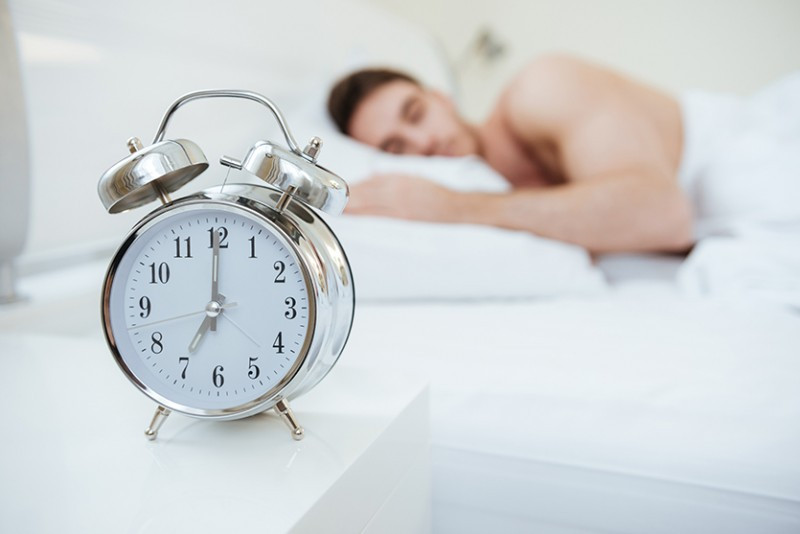There's never a bad time to talk about sleep. When you're sleeping well, you look forward to it and can enjoy telling others what works for you. If things aren't going so well in the snooze department, talking it out with your doctor or another sleep expert can be the right remedy to make things well once your head hits the pillow. One interesting thing about sleep is trying to define what a good night's sleep is. Some folks might think they are sleeping well, maybe getting by on five hours or less a night, without realizing it's likely to catch up to them someday. Others might actually be getting enough hours – and that includes quality hours – of sleep without knowing it, perhaps often waking up in the morning feeling like it's been a restless or fitful night, even when it actually hasn't been; or, at least, not as bad as they thought.
A Sleep Study on Guidelines
About a year and a half ago, the National Sleep Foundation published a set of sleep-quality recommendations formulated by a board of medical experts, who reviewed more than 270 previous sleep studies, per health.com. The goal – to come up with some quantifiable guidelines to define what constitutes a good night's sleep and what doesn't. Dr. Philip Gehrman, a sleep-medicine specialist, as quoted by health.com, summed up the new guidelines by saying, Not only will it help people know when their sleep is poor, but sometimes people think they are bad sleepers when really they're in the normal range. In brief, here are the sleep guidelines considered normal (i.e., healthy):- You fall asleep in 30 minutes or less. If it takes longer, most likely you're going to bed too early for your internal clock, or you're involved in activities considered too stimulating for sleep, like watching a horror movie or playing a tense video game.
- You wake up for five minutes or more, more than once a night. For adults 65 and over, twice a night is fine.
- You fall back asleep within 20 minutes. If it goes beyond that, get out of bed, go to another room, and read until you feel ready to go back to sleep.
- You're asleep 85 percent of the time you're in bed. Your bed should be only for sleep and sex. Don't use your bed for, say, balancing your checkbook, reading email, or conversing on the phone. If you go to bed at 10 and get out of bed at 7 in the morning, you've slept at least 7.5 hours; you're good. That's what you want – between 7 and 8 hours of sleep a night.
Seven Tips for Better Sleep
If you aren't hitting the above guidelines – or even if you are and you still think something is missing – check out the following sleep tips to try and improve your numbers:- Follow a sleep schedule. Aim for eight hours a night, per mayoclinic.org, and move things around so that you can get to bed and get up close to the same times, respectively, and that includes weekends.
- Watch what you eat or drink, and when. Don't go to bed starved or stuffed; avoid heavy meals within two hours of beddy-bye time. Also, caffeine, nicotine, and alcohol soon before bedtime are no-no's.
- Exercise at least five days a week, if not daily. Be sure to consult with your physician first, though, before starting any new exercise regimens. You'll not only be healthier while awake, but your body will be better prepared to rest when it's time to go to bed.
- Make sure you're sleeping on a comfortable mattress. Be good to yourself: don't settle for anything less than what feels ideal. A mattress should not only be supportive, but comfortable.
- Get your bedroom right. Most people sleep better in a cooler room – between 60 and 67 degrees Fahrenheit is a good range, per sleepfoundation.org. If you want to save on AC, try using a floor fan or even installing a ceiling fan. Also, the darker the room the better. If you have window blinds, close them. If there still is light seeping in – say, from moonlight or a streetlight – consider blackout curtains.
- Minimize nap time during the day. Especially in the late afternoon, early evening. That can hinder your regular nightly sleep, especially when it comes to falling asleep. If it is late afternoon/early evening and you just can't stay awake, go ahead and crawl into bed and consider that your bedtime for that day. If you wake up at 2 or 3 a.m., go read in that other room, then come back to bed when sleepy again.
- Meditation and visualization. Meditation can calm the mind and clear out distracting thoughts, per organicfacts.net, while visualization of tranquil, peaceful settings can help slow down a racing mind.
Sleep-inducing Snacks and Supplements
And for some added help in terms of sleep aids, consider adding the following to your pantry or kitchen cupboards:- Sweet potato toast. Per goodhousekeeping.com, this is a nice, light nighttime treat that offers potassium, magnesium, and calcium to help you relax.
- Melatonin. A popular supplement known as an effective sleep inducer without leaving you feeling like a zombie the next day.
- Herbal teas. Caffeine-free teas are available, too. Two selections recommended by Good Housekeeping are chamomile tea and ginger tea, which are good for calming the nerves and soothing the stomach, respectively.
- Almonds. A handful will do. Tryptophan and magnesium are among the substances found in almonds. They are known for slowing muscle and nerve function while also regulating your heartbeat.
- Oatmeal. Yes, it still works well for breakfast, and it's a great fit for a bedtime snack because by raising your blood sugar naturally, oatmeal makes you feel sleepy. It's also rich in melatonin, which relaxes the body to help you fall asleep.
- Cherries. Yet another source of melatonin.

